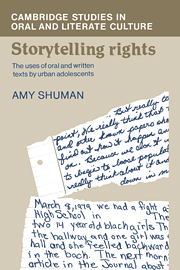Book contents
- Frontmatter
- Contents
- Acknowledgments
- Introduction
- 1 Fight stories: what counts is the recounting
- 2 Storyability and tellability
- 3 Collaborative uses of literacy in the adolescent community
- 4 Retellings
- 5 Varieties of contextuality
- 6 Familiarity and distance: toward a theory of oral and written personal narration
- Notes
- Bibliography
- Index
2 - Storyability and tellability
Published online by Cambridge University Press: 05 November 2011
- Frontmatter
- Contents
- Acknowledgments
- Introduction
- 1 Fight stories: what counts is the recounting
- 2 Storyability and tellability
- 3 Collaborative uses of literacy in the adolescent community
- 4 Retellings
- 5 Varieties of contextuality
- 6 Familiarity and distance: toward a theory of oral and written personal narration
- Notes
- Bibliography
- Index
Summary
Whereas storyability (what gets told as a story) concerns seemingly unlimited possibilities for the content of stories, tellability (who has the right to tell a story) concerns limitations or prohibitions on telling. Tellability is potentially limited by concerns for discretion, sanctions against invasion of privacy, promises of secrecy, and discouragement of immodesty. The adolescents were particularly concerned with these limitations and focused more concern on whether a person had violated the unstated prohibitions in telling a story than on whether the story was good. Their evaluations focused on entitlement more than on the amplification of the incidents described. This focus was safer from challenges of exaggeration or inaccuracy and, in addition, redirected attention from the incidents to the current storytelling situation.
Storyability is most often evaluated retrospectively, although categories of storyable events may exist prior to individual instances of them. Further, people may engage in certain behaviors with a prior awareness that their behaviors belong to a certain category. People sometimes play out behaviors as though in a script, and they may announce, while in the midst of an activity, their intention to report the experience to others. The statement “Just wait till I tell my friends about this” acknowledges that the experience is storyable. In contrast, some events may not be appropriately told as stories.
- Type
- Chapter
- Information
- Storytelling RightsThe Uses of Oral and Written Texts by Urban Adolescents, pp. 54 - 76Publisher: Cambridge University PressPrint publication year: 1986



